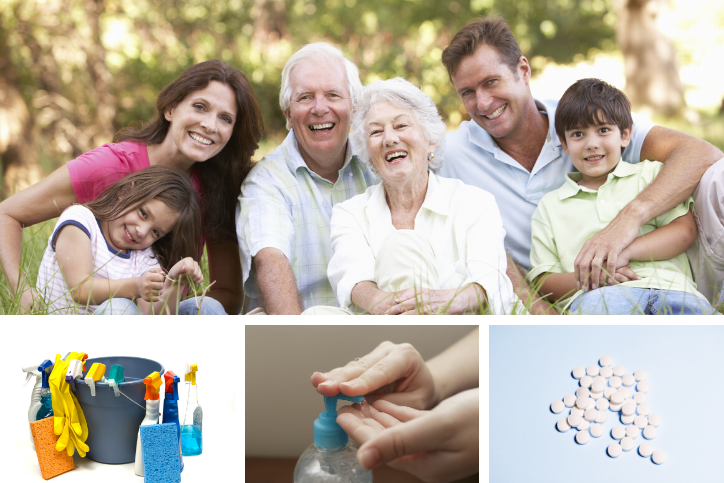Poison Safety During the Coronavirus Pandemic
Written By: Emily Paterson, BS, CHES, Public Education and Communication Specialist for the Maryland Poison Center
Editor’s Note: This post was originally published on the Maryland Poison Center’s (MPC) eAntidote blog. Explore the eAntidote blog for a behind the scenes look at life at a poison center, practical tips to keep your family safe, and a hard look at current poison news and trends.
Poisonings are more likely to happen when people find themselves in a different routine or environment, or they are struggling to find activities to keep them occupied. To make sure your home is poison-safe for everyone during the coronavirus pandemic, follow the tips below.
Cleaning Products
- Do not mix cleaners together. This can cause a chemical reaction, which can lead to an unpleasant and sometimes harmful smell. If you want to use two cleaners in the same area, use one product, rinse it completely away, then use the next product. Turn on a fan or open the windows if a smell becomes overwhelming.
- Supervise children around cleaning products. Children may imitate adult behavior and try to use a cleaning product while unsupervised. This puts them at risk for ingestion and getting the cleaner in their eyes.
- When using a disinfectant wipe or spray on a surface or item, allow it to dry completely before handling it. Once the product dries, it doesn’t pose a threat.
- If you get any cleaning product in your eye, flush the eye with lukewarm (not hot) water poured from a large glass two or three inches from the eye or from the faucet or shower and repeat this for 15 minutes. Blink as much as possible while flooding the eye, but do not force the eyelid open. Afterwards, call the poison center for more information.
- Store all cleaning products in their original, labeled containers. Do not use food or beverage containers. Using those containers can mislead both children and adults, and lead to a poisoning.
- When not in use, store products up, away, and out of sight.
- Products such as oven cleaner, toilet bowl cleaner, soap scum remover, and drain opener can cause more severe effects than other cleaners. We recommend storing these products in a locked cabinet.
Hand Sanitizer
- The concentration of alcohol in hand sanitizers ranges from 45-95%, with the most popular brands containing 60-65%.
- One pump of the bottle will dispense approximately ½ teaspoon or 2.5 milliliters (ml) of hand sanitizer. Swallowing this pea sized amount before rubbing it into the hands will not cause a problem, even for a small child.
- Once it is rubbed into the hands, the alcohol evaporates and no longer poses any problems to people or pets.
- It is possible for teens and adults to intentionally ingest hand sanitizer.
- To learn more, check out our hand sanitizer safety blog and hand sanitizer information sheet.
Chloroquine and Hydroxychloroquine
- These two medicines are being studied as potential treatments for coronavirus patients.
- Only take these medicines if prescribed by a doctor, and do not share them with anyone.
- These medicines can be dangerous if taken in the wrong amount or by the wrong person. They can be extremely harmful to children.
- To learn more, check out our information sheet on chloroquine and hydroxychloroquine.
With all of these products, safe storage plays an important part in preventing poisonings. Store these, and other potential poisons, up, away, and out of sight. Our poison safety checklist is a great tool to use as you go through rooms in your house to help you become aware of potential poisons in the home so you can store them safely.
Remember, the Maryland Poison Center is still open 24/7 during the coronavirus pandemic. Specialists are ready to assist callers with poison information and help. Call 1-800-222-1222 if you or someone you know have been exposed to any of the above products. Do not wait for symptoms. We can help you determine if a hospital visit is necessary. Your call is always free and confidential.

